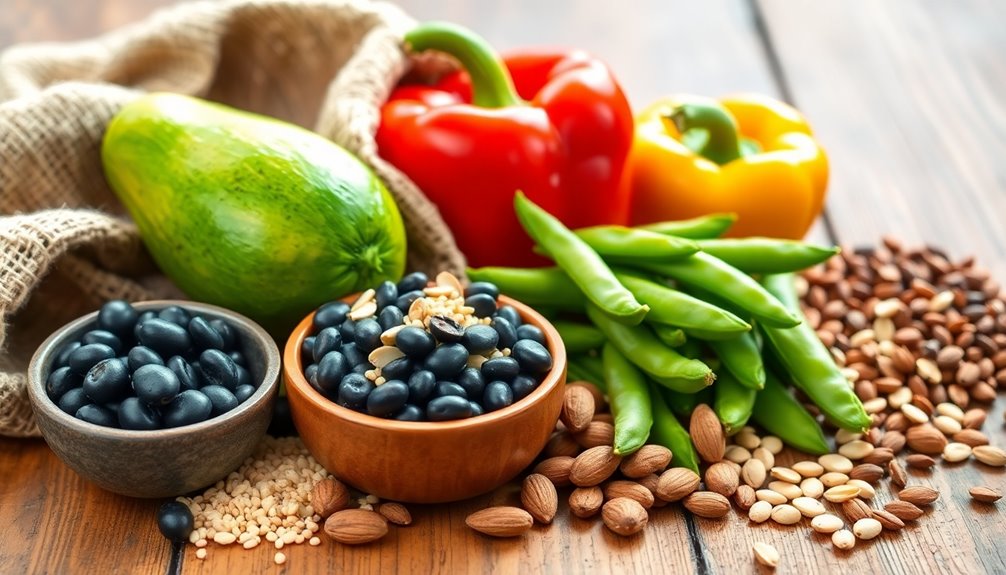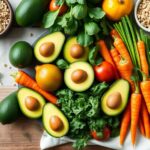When you're looking for the best plant-based protein sources as a vegan, focus on legumes and pulses—they're rich in protein, fiber, and essential nutrients. Nuts and seeds add healthy fats and versatility to your meals, while whole grains like quinoa provide complete proteins. Don't forget about soy products, such as tofu and tempeh; they're packed with essential amino acids. If you're seeking convenience, plant-based protein powders, like pea or brown rice protein, can enhance your diet easily. Each of these options contributes to a balanced nutritional intake, so keep exploring to uncover even more delicious choices.
Key Takeaways
- Legumes and pulses are rich in protein, fiber, and essential nutrients, making them excellent choices for vegans.
- Nuts and seeds provide healthy fats and plant-based protein, enhancing overall nutrition in a vegan diet.
- Whole grains like quinoa and brown rice offer vital nutrients and fiber, serving as versatile staples in vegan meals.
- Soy products, such as tofu and tempeh, are complete protein sources that support heart health and bone density.
- Plant-based protein powders, like pea and brown rice protein, provide concentrated protein and can be easily added to various dishes.
Legumes and Pulses
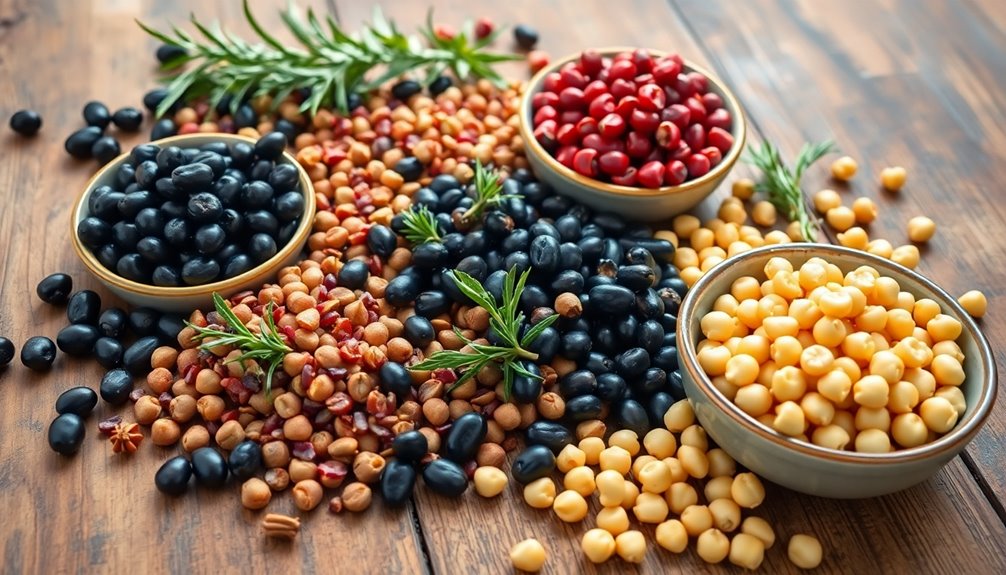
Legumes and pulses are powerhouse foods that should be staples in any vegan diet. Packed with protein, fiber, vitamins, and minerals, they offer numerous health benefits that can enhance your overall well-being. Research shows that incorporating legumes like lentils, chickpeas, and beans can support heart health, improve digestion, and even assist in weight management. By including these nutrient-dense foods in your meals, you're making a wise choice for your health.
When it comes to cooking tips, soaking your legumes before cooking can notably reduce cooking time and improve digestibility. For dried beans, soak them overnight or for at least 6-8 hours. This not only helps in softening them but also removes some of the compounds that can cause gas.
If you're short on time, opt for canned varieties; just be sure to rinse them to lower sodium content.
Experimenting with different recipes can also keep your meals exciting. Try adding legumes to salads, soups, or stews for added texture and flavor. You can even blend chickpeas into hummus or use lentils as a meat substitute in tacos and burgers.
Nuts and Seeds
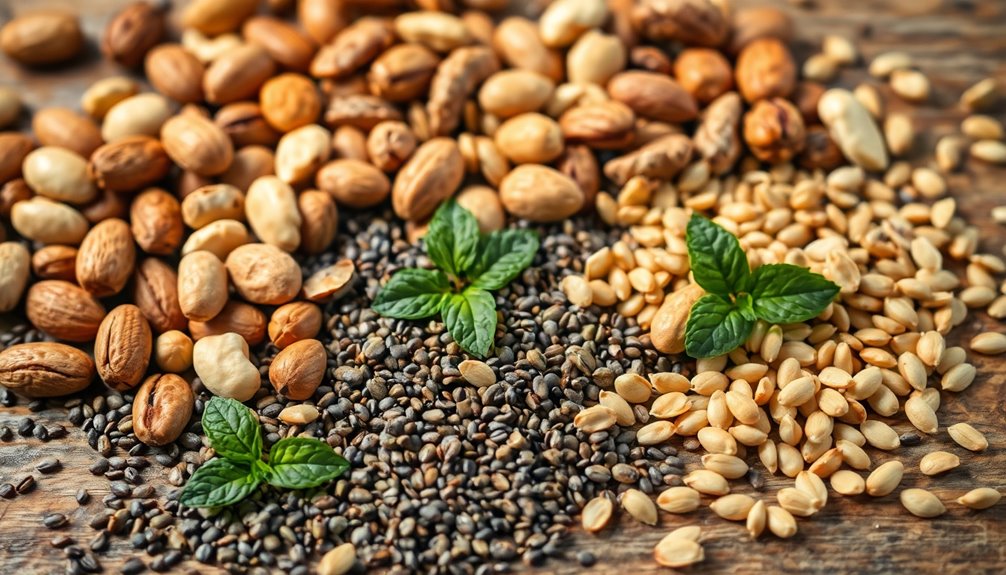
Nuts and seeds are pivotal components of a balanced vegan diet, offering a rich source of plant-based protein, healthy fats, and indispensable nutrients. Incorporating these tiny powerhouses into your meals not only enhances flavor but also boosts your nutritional intake. Let's explore their nutritional benefits and culinary uses:
- Protein Powerhouses: Nuts and seeds pack a protein punch, with varieties like almonds and pumpkin seeds containing up to 30% protein by weight. This makes them a fantastic addition to your diet.
- Heart-Healthy Fats: They're high in unsaturated fats, which can help improve heart health. Walnuts, for instance, are an excellent source of omega-3 fatty acids.
- Vitamins and Minerals: Nuts and seeds are loaded with essential vitamins and minerals. For example, chia seeds are rich in calcium, while sunflower seeds provide a good dose of Vitamin E.
- Versatile Culinary Uses: You can easily incorporate them into your meals. Use almond butter on toast, sprinkle chia seeds on smoothies, or toss sunflower seeds into salads for added crunch.
Whole Grains
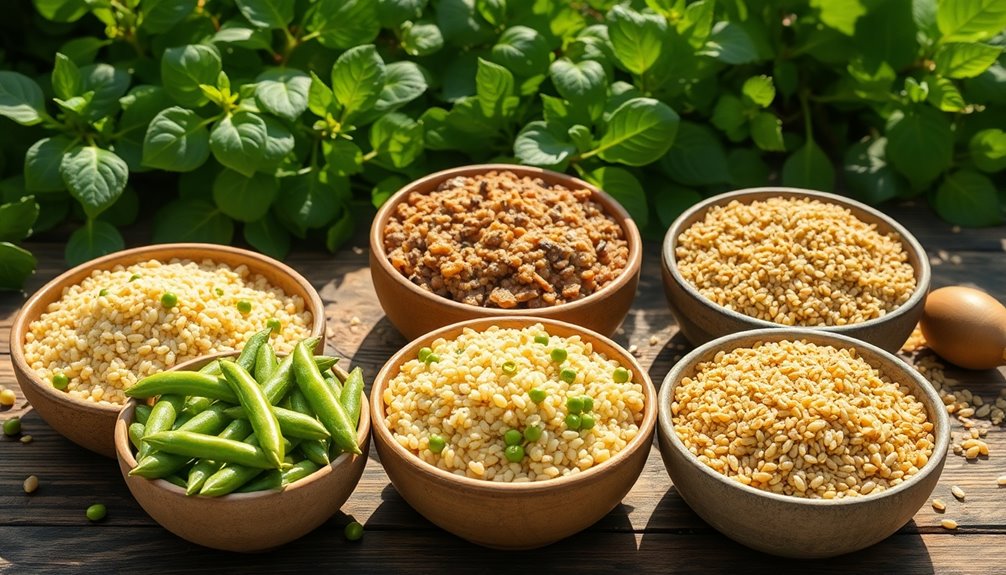
Whole grains are important staples in a vegan diet, providing not only a hearty source of plant-based protein but also a wealth of fiber and vital nutrients. Incorporating whole grains into your meals can help you feel fuller longer and support digestive health. They're versatile and can easily fit into your daily routine.
One standout option is quinoa, which boasts numerous benefits. This ancient grain is a complete protein, meaning it contains all nine essential amino acids your body needs. It's also rich in magnesium, iron, and antioxidants, making it a powerhouse for overall health. You can enjoy quinoa in salads, bowls, or even as a breakfast porridge.
When it comes to brown rice options, you can't go wrong. Brown rice is an excellent source of complex carbohydrates and protein, while also being high in fiber. It helps regulate blood sugar levels and promotes heart health. Whether you choose long-grain, short-grain, or jasmine, brown rice can be a delicious base for stir-fries, grain bowls, or paired with your favorite vegetables.
Don't underestimate the power of whole grains. They not only contribute to your protein intake but also enhance your meals with flavor and texture. By including a variety of whole grains like quinoa and brown rice in your diet, you'll feel satisfied and supported on your vegan journey. So, get creative and enjoy the nutritious benefits they've to offer!
Soy Products
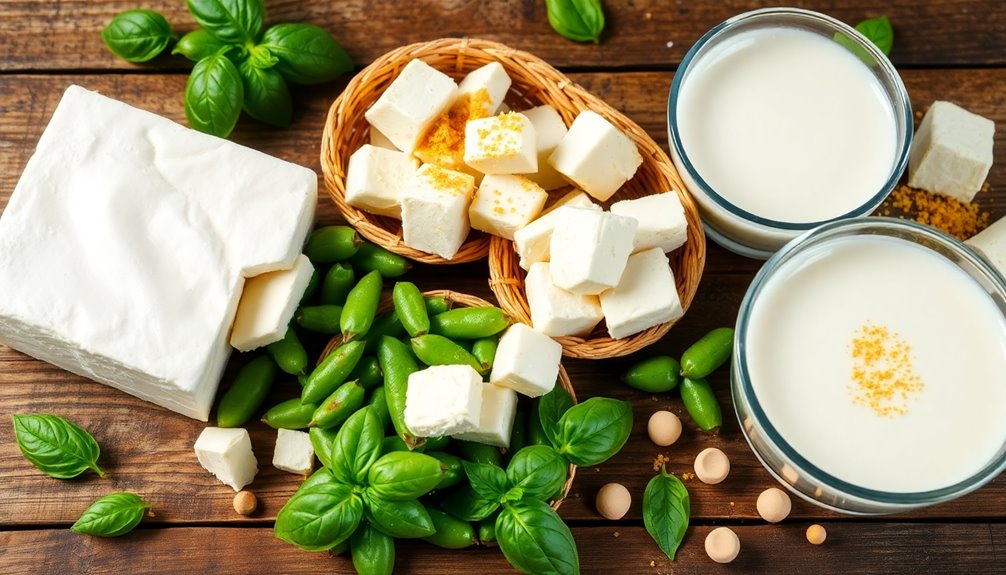
In addition to whole grains, soy products play a pivotal role in a vegan diet, offering a rich source of plant-based protein. Incorporating soy into your meals not only enhances flavor but also provides numerous health benefits. Here are some key soy protein benefits you should know:
- Complete Protein Source: Soy contains all essential amino acids, making it a complete protein ideal for vegans.
- Heart Health: Research shows that soy protein can help lower bad cholesterol levels, supporting cardiovascular health.
- Bone Health: Isoflavones in soy are linked to improved bone density, which is vital for preventing osteoporosis.
- Versatility: From tofu to tempeh, soy products can be easily incorporated into a variety of dishes, making cooking with soy-based ingredients both fun and nutritious.
When cooking with soy, you can experiment with different textures and flavors. For instance, you might sauté tofu for stir-fries, use edamame in salads, or add soy milk to smoothies.
The adaptability of soy allows you to enjoy diverse cuisines while reaping the nutritional benefits.
Plant-Based Protein Powders
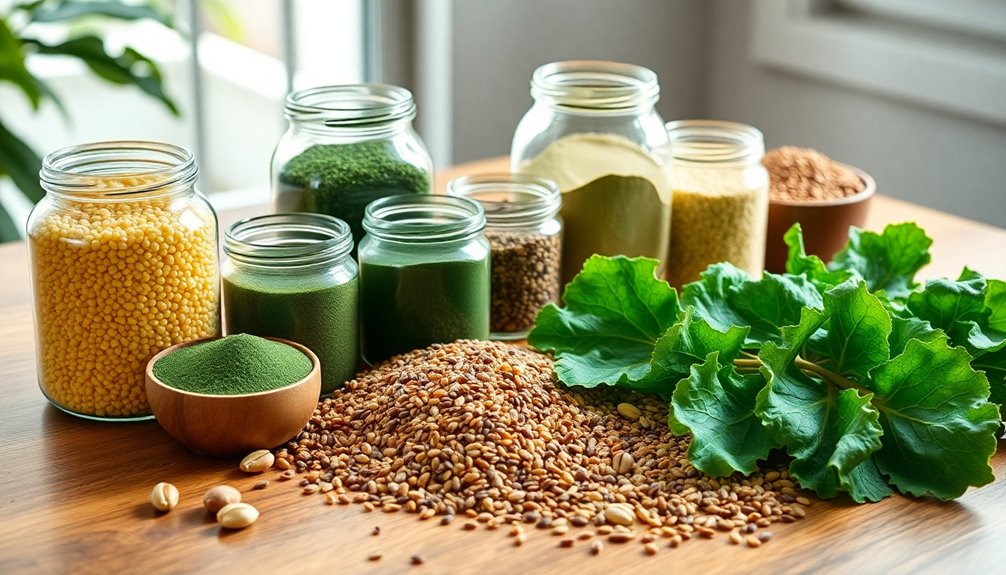
Exploring plant-based protein powders can significantly enhance your vegan diet by providing a concentrated source of protein that's easy to integrate into your meals. These powders not only offer supplement benefits but also cater to various taste preferences, making them a versatile addition to your nutritional arsenal.
When selecting a protein powder, considering the source and nutrient profile is crucial. Here's a quick comparison of popular options:
| Protein Source | Protein Content (per serving) | Taste Profile |
|---|---|---|
| Pea Protein | 20g | Earthy, mild |
| Brown Rice Protein | 18g | Nutty, slightly sweet |
| Hemp Protein | 15g | Grassy, robust |
Pea protein stands out for its high digestibility and amino acid profile, making it a favorite among many vegans. Brown rice protein offers a complete amino acid profile when combined with other protein sources, while hemp protein is rich in omega-3 fatty acids, contributing to overall health.
Incorporating these powders into smoothies, oatmeal, or baked goods is simple and efficient. Remember, the essential aspect is to select a flavor that aligns with your taste preferences – whether you prefer something chocolatey, vanilla, or even unflavored. By doing so, you'll not only meet your protein needs but also enjoy the process of nourishing your body. Embrace the variety and find what works best for you!
Frequently Asked Questions
Can I Get Enough Protein on a Vegan Diet?
Absolutely, you can get enough protein on a vegan diet! Focus on incorporating a variety of protein-rich foods like lentils, chickpeas, and quinoa. If you're ever in doubt, protein supplements can help fill gaps in your intake.
Also, keep some protein-rich snacks handy, like edamame or nuts, to boost your protein levels throughout the day. With a little planning, you'll thrive on a vegan diet while meeting your protein needs!
How Do I Combine Plant Proteins for Complete Amino Acids?
You might think getting complete amino acids on a vegan diet is tough, but it's easier than you think!
By practicing protein pairing, you can combine different plant proteins like beans and rice or hummus and whole grain bread. This helps maximize protein absorption and guarantees you get all essential amino acids.
Are There Any Risks of Consuming Too Much Plant Protein?
Consuming too much plant protein can disrupt your protein balance and lead to imbalances in your nutritional needs. While plant proteins offer various health benefits, overdoing it might cause digestive issues or nutrient deficiencies if you neglect other food groups.
It's crucial to maintain a well-rounded diet, ensuring you get enough vitamins, minerals, and other macronutrients. Aim for variety to support your overall health and keep your meals enjoyable and satisfying.
What Are the Best Cooking Methods to Preserve Protein in Plants?
You might think that cooking plant proteins always leads to nutrient loss, but it doesn't have to! To preserve protein, avoid high heat methods like frying. Instead, opt for steaming or boiling. These methods help retain essential nutrients while keeping the protein intact.
Steaming, in particular, is gentle and effective, ensuring you get the most from your meals. By using these techniques, you'll enjoy delicious dishes without sacrificing the protein content you need.
How Do I Read Labels for Plant-Based Protein Products?
When you read labels for plant-based protein products, focus on ingredient sourcing to guarantee quality. Check the nutritional content for protein amounts and other essential nutrients. Don't forget to look at allergen information to avoid any unwanted reactions, especially if you have sensitivities. Finally, pay attention to the serving size; it helps you understand how much protein you're actually getting per portion. This way, you can make informed choices that fit your dietary needs.
Conclusion
In the garden of nutrition, plant-based proteins bloom like vibrant flowers, offering crucial nourishment for your journey. By embracing legumes, nuts, whole grains, soy products, and protein powders, you weave a tapestry of health that supports your body and spirit. Each bite you take nurtures your strength, much like a river flowing through the landscape, sustaining life. As a vegan, you hold the access to this bounteous harvest, revealing endless possibilities for energy and well-being.

